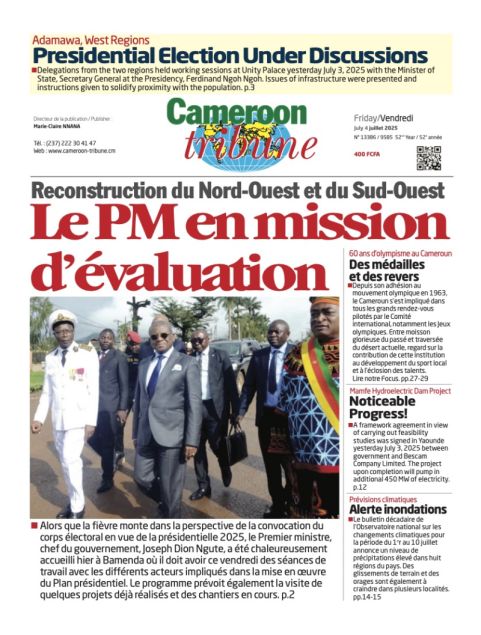Decentralisation : Unblock The Key Resources!
- Par Godlove BAINKONG
- 27 juin 2022 11:52
- 0 Likes
Taking governance closer to the governed or getting the central government to relinquish some of its sovereign powers to the grassroots like Cameroon has been struggling to do within the framework of its decentralisation process has had enough paperwork over the years. In effect, Regions which fully went operational in 2021 as local authorities are the last institution enshrined in the 1996 Constitution to complete the decentralisation process in the country.
While the two English-speaking North West and South West Regions, through their Special Status reflecting their cultural and language specificities, now have Regional Assemblies and Houses of Chiefs, the other eight regions have Regional Councils. The North West and South West Regions also each has a Public Independent Conciliator to examine and amicably settle disputes between users and regional and council administrations. These add to City and Municipal Councils to practically set the stage for a ‘Government of the people by the people.’ Clearly, the process has all the much-required legal instruments in place to bolster the decentralisation process intended to champion balanced socio-economic development.
It sounds awesome and from a hindsight depicts the will of the Head of State to get the population fully involved and participate in developing their own areas. This goes in line with the Head of State’s successive speeches over the years. For example, President Paul Biya underlined during his State-of-the-nation’s address to his compatriots on December 31, 2021 that, “Overall, regionalisation is being implemented countrywide and contributes towards increasing our fellow citizens’ participation in the management of local affairs.” Understandably, these democratic strides very clearly demonstrate that the country is irreversibly and resolutely engaged in the methodical perfection of its democratic process to further meet the sincere aspirations of the people who have been desiring to know what is being done for them, tell the government what they need and join hands in giving their respective areas the development they desire. Logically so as working for a people without them and sometimes giving them other than what they need, may be at a given time, could be looked upon as working against them. Reason why decentralisation has been clamoured for.
The decentralisation structures are fully in place and their management bodies wholly constituted. However, the population’s thirst for palpable results still remains unquenched. 2022 marks the second year since the Regions went into full force. It looks like all of 2021 and already half of 2022 are simply dedicated to ensure the implantation of Regions on the field. The much-trumpeted change that the advent of these decentralised structures heralded is taking too long to come and the populations are waiting. People are eagerly looking up to their Councils and Regions to deliver on what officials presented as their development projects; call them manifestoes, to get voted into office. The wait is taking too long!
Someone somewhere might talk of patience which the population should exercise. Granted; there should be visible signs that something is being done for the boasted revolution to come. It is known to some, if not to all at least, that good fruits take time to bear and get ready. But this requires planting, weeding, pruning et al. There seems to be much talk about the decentralisation process in the country than the real will of some senior State functionaries to really let go some of their sovereignties. If not, why is the transfer of human and financial resources moving at almost snail-pace even when all is already done with paperwork. Evidently, this can only be for the selfish reasons given that the Head of State has severally expressed firm belief on how he thinks fast-tracking the country’s decentralisation process could enhance the development of the Regions. A view shared by many within and without.
From the look of things, two key issues remain unresolved – human and financial resources, which incidentally are indispensable for the proper functioning of the decentralised bodies and the fruition of the projects executives have already drafted for their areas. Almost all Councils and Regions now boast of development plans with projects spanning through all life-changing sectors. Councils and Regions need the requisite finances as well as qualified manpower to pilot their projects to fruition for the good of their people. One cannot go before the other. Money, it is known, is the pivot of every human action. In the case of decentralisation, money enhances the recruitment of qualified men and women to handle council and regional projects. The country might have the best laws on decentralisation but once the much-needed primarily financial and then human resources are absent, insufficient or taking too long to come, like is the case in Cameroon now, already drafted growth plans can only be good for the drawers and when they tarry, the dustbin ends up swallowing th...
Cet article complet est réservé aux abonnés
Déjà abonné ? Identifiez-vous >
Accédez en illimité à Cameroon Tribune Digital à partir de 26250 FCFA
Je M'abonne1 minute suffit pour vous abonner à Cameroon Tribune Digital !
- Votre numéro spécial cameroon-tribune en version numérique
- Des encarts
- Des appels d'offres exclusives
- D'avant-première (accès 24h avant la publication)
- Des éditions consultables sur tous supports (smartphone, tablettes, PC)











Commentaires